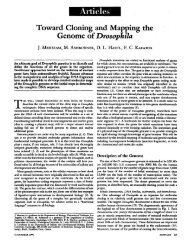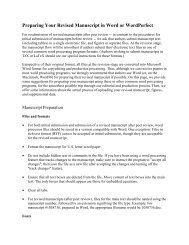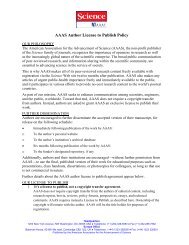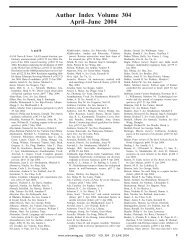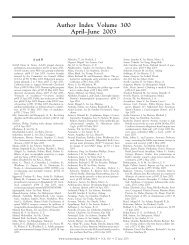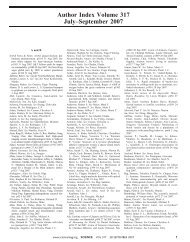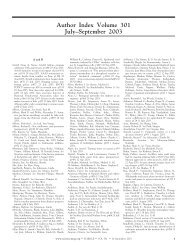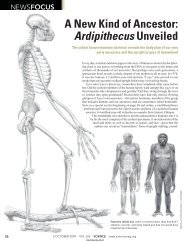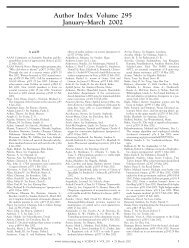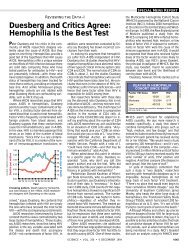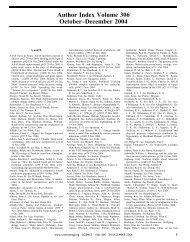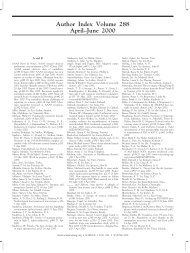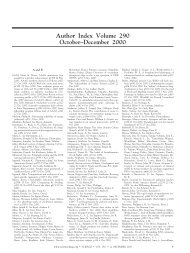Chinese Academy of Sciences (PDF) - low res version
Chinese Academy of Sciences (PDF) - low res version
Chinese Academy of Sciences (PDF) - low res version
Create successful ePaper yourself
Turn your PDF publications into a flip-book with our unique Google optimized e-Paper software.
CREDITS: COURTESY OF CAS<br />
Talent and Education in CAS<br />
CAS Talent Cultivation<br />
and Recruitment Program<br />
Introduction<br />
In September 2009, <strong>Chinese</strong> <strong>Academy</strong> <strong>of</strong> <strong>Sciences</strong> (CAS) launched the<br />
Talent Cultivation and Recruitment Program. This is a system-wide project,<br />
aimed at increasing recruitment and developing talent in various fields, with<br />
an overall goal <strong>of</strong> creating greater adaptability to the constantly changing<br />
requirements for expertise in China.<br />
This program includes four major components. The first is the “Cultivation<br />
and Recruitment Plan <strong>of</strong> High-Level Talent,” which is being implemented<br />
mainly through the national Thousand Talents Program and the CAS Hundred<br />
Talents Program. These plans select top-level scientists who demonstrate<br />
ambition, ability, and passion. The second component is the “Cultivation<br />
Plan <strong>of</strong> Excellent Young Scientists,” which aims to advance young<br />
scientists by providing special funding and through the establishment <strong>of</strong><br />
organizations like the Youth Innovation Promotion Association. The third<br />
part <strong>of</strong> the program is the “Training Plan for Technical Talents and Administrators,”<br />
which aims to retain the key technical talent within CAS, while<br />
recruiting further outstanding technical talent, and recognizing and motivating<br />
these experts in effective ways. The fourth component is the “Overseas<br />
Intelligence Introduction and International Exchanges Plan,” which focuses<br />
on attracting and sponsoring outstanding overseas scholars and international<br />
scientists who are active at the forefront <strong>of</strong> science and technology<br />
to visit or work at CAS.<br />
By the end <strong>of</strong> 2011, CAS had successfully introduced 253 high-level<br />
overseas <strong>res</strong>earchers through the Thousand Talents Program, and recruited<br />
and supported 2,273 outstanding scientists from both domestic<br />
and overseas institutes, through the Hundred Talents Program. In addition,<br />
690 young scientists have been given targeted, comprehensive <strong>res</strong>earch<br />
training by the Youth Innovation Promotion Association. Moreover, CAS selects<br />
and supports 300 young scientists annually for study abroad. In order<br />
to strengthen the cultivation <strong>of</strong> excellent young scientists in the institutes<br />
located in the western region <strong>of</strong> China, CAS has launched the “Western<br />
Light Scientists Project”. To date, 876 scientists have been sponsored, 187<br />
Ph.D. students have been trained, and 234 visiting scholars from the western<br />
provinces have been nurtured through this project. To build a strong<br />
team <strong>of</strong> support staff at CAS institutes, awards—financial and otherwise—<br />
have been given to 78 technical experts at home and abroad. Meanwhile,<br />
nearly 4,000 top workers have attended training and management courses<br />
through Lenovo College, as well as various training courses, forums, and<br />
seminars. To support international cooperation, 92 <strong>res</strong>earch groups have<br />
been formed through the International Partner Group Program, which has<br />
attracted 694 excellent scientific <strong>res</strong>earch personnel. Furthermore, 742<br />
outstanding foreign scientists have been brought to China and honored<br />
as CAS Visiting Pr<strong>of</strong>essors for Senior International Scientists, while 240<br />
young <strong>res</strong>earchers from different countries have won the CAS Fel<strong>low</strong>ships<br />
for Young International Scientists.<br />
The CAS Hundred Talents Program<br />
Introduced in 1994, the Hundred Talents Program is the first high-quality<br />
talent recruitment program in China. With financial support from the<br />
Ministry <strong>of</strong> Finance, the goal <strong>of</strong> the program is to recruit hundreds <strong>of</strong><br />
outstanding young scientists from abroad and within China through the<br />
end <strong>of</strong> the 20th century. To ensure successful implementation, CAS made<br />
the fol<strong>low</strong>ing improvements: institutes are<br />
authorized to create positions according<br />
to actual demands; select the awardees<br />
with an open, transparent, and competitive<br />
selection process; perform the recruitment<br />
process openly; and provide financial<br />
support to the awardees.<br />
The plan has been gradually expanded,<br />
particularly during the national 12th Five-<br />
Year Plan period. According to the National<br />
Medium- and Long-term Talents Development<br />
Program and the CAS Talents Strategic<br />
Plan, CAS has further improved the<br />
management in many ways, including al<strong>low</strong>ing<br />
foreigners to apply, increasing financial<br />
support, increasing the number <strong>of</strong><br />
awardees, and expanding the award categories.<br />
At p<strong>res</strong>ent, the program supports<br />
not only the returnees from overseas but<br />
also the talent recruited from domestic organizations<br />
as well as providing additional<br />
financial support to the awardees <strong>of</strong> the<br />
National Science Fund for Distinguished<br />
Young Scholars [1] and the Youth Thousand<br />
Talents Program [2]. CAS also encourages<br />
institutes to directly recruit talent from<br />
aboard. When the program has been operational<br />
for three years, CAS will assess<br />
CAS/In Focus<br />
Pr<strong>of</strong>essor Pan Jianwei (center), an awardee in the Thousand<br />
Talents Program, discusses an experiment in multiphoton<br />
entanglement with his colleagues and students.<br />
Pr<strong>of</strong>essor Chen Yaning (third from left), sponsored by the Western<br />
Light Scientists Project, elucidates the eco-hydrological process,<br />
the mechanisms, and adaptation strategy <strong>of</strong> the desert riparian<br />
fo<strong>res</strong>t in <strong>res</strong>ponse to drought st<strong>res</strong>s in arid region <strong>of</strong> the Inland<br />
River Basin.<br />
By the end <strong>of</strong><br />
2011, CAS had<br />
successfully<br />
introduced<br />
253 high-<br />
level overseas<br />
<strong>res</strong>earchers<br />
through the<br />
Thousand Talents<br />
Program.<br />
39



